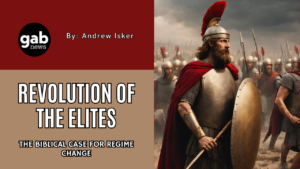One of the most commonly held ideas within conservative evangelicalism is that “cultural Christianity is bad because it produces nominal Christians.” Nearly everyone has heard this from evangelical pulpits at one time or another. The former head of the Southern Baptist Convention’s Ethics and Religious Liberty Commission, now a professional accuser of the brethren at Christianity Today, famously said, “Mayberry leads to hell just as certainly as Gomorrah does.”
There was a time when it seemed to make sense. When the entire world around you was clearly influenced by Christian moral teaching, and everyone knew that everyone else expected you to live more or less in this Christian-influenced way, there were many people who thought they were saved because they considered themselves “good people” because they lived within these moral bounds and not because they trusted in Jesus Christ alone for their salvation. This was a very real problem that pastors had to deal with as they sought to minister to their flocks.
But today we are seeing that bemoaning “cultural Christianity” when the Christian religion had cultural dominance in America is like a trust-fund brat complaining that the Michelin-starred restaurant does not have her favorite kind of caviar. If you only knew just how good you had it. We traded having our biggest pastoral problem be “people living in a society that is so well-ordered they think they are going to heaven because of it” for “children being propagandized 24/7 into anal sex and genital mutilation.” To think that “cultural Christianity” was ever a real problem was to have no historical perspective.
“Cultural Christianity” was never a problem, “cultural Christianity” was the fruit of generations of obedience. Put another way, “cultural Christianity” was a problem like a lifetime of extremely hard work producing massive wealth for your children and grandchildren to inherit is “a problem.” Is it possible that your children will grow up being born on third base thinking they hit a triple? Yes. That is always the danger of success. But to treat the results of faithfulness as something worse than crushing poverty is utter foolishness.
This isn’t some unique or idiosyncratic take on “cultural Christianity.” It is the Bible’s perspective on it. God’s Word gives us an example of what happens when God’s people are faithful:
28:1 “Now it shall come to pass, if you diligently obey the voice of the Lord your God, to observe carefully all His commandments which I command you today, that the Lord your God will set you high above all nations of the earth. 2 And all these blessings shall come upon you and overtake you, because you obey the voice of the Lord your God:
3 “Blessed shall you be in the city, and blessed shall you be in the country.
4 “Blessed shall be the fruit of your body, the produce of your ground and the increase of your herds, the increase of your cattle and the offspring of your flocks.
5 “Blessed shall be your basket and your kneading bowl.
6 “Blessed shall you be when you come in, and blessed shall you be when you go out.
7 “The Lord will cause your enemies who rise against you to be defeated before your face; they shall come out against you one way and flee before you seven ways.
8 “The Lord will command the blessing on you in your storehouses and in all to which you set your hand, and He will bless you in the land which the Lord your God is giving you.
9 “The Lord will establish you as a holy people to Himself, just as He has sworn to you, if you keep the commandments of the Lord your God and walk in His ways. 10 Then all peoples of the earth shall see that you are called by the name of the Lord, and they shall be afraid of you. 11 And the Lord will grant you plenty of goods, in the fruit of your body, in the increase of your livestock, and in the produce of your ground, in the land of which the Lord swore to your fathers to give you. 12 The Lord will open to you His good treasure, the heavens, to give the rain to your land in its season, and to bless all the work of your hand. You shall lend to many nations, but you shall not borrow. 13 And the Lord will make you the head and not the tail; you shall be above only, and not be beneath, if you heed the commandments of the Lord your God, which I command you today, and are careful to observe them. 14 So you shall not turn aside from any of the words which I command you this day, to the right or the left, to go after other gods to serve them.
Deuteronomy 28:1-14 (NKJV)
It is true, the situation of Israel as they are about to conquer the land of Canaan is different than ours. The main difference is that instead of a single geographical territory, God has called us to conquer the entire planet. In His resurrection, Jesus won back His world from Satan, and just before His ascension where He sat down to rule at His Father’s right hand, he told His disciples that all authority in heaven and on earth had been given to Him, and they were to go forth and disciple the nations, to conquer them by baptizing them and teaching them what He has commanded (Matthew 28:18-20). Israel’s conquest of Canaan is a type of conquest of the world by the church. The main difference is that this conquest is far more glorious. God brings His people from glory to glory, and rather than conquering by wielding death, His people conquer by wielding new life.
So these promises to Israel can be applied to nations that are baptized and discipled into Christ’s kingdom. This is the blueprint for what happens when a people together accept God’s way of living. When a people together collectively live the way God has commanded, blessings will follow. Deuteronomy 28 is not about a random assortment of individuals living faithful, but an entire society together. It does not assume that literally every, single person will have a saving relationship with the Lord, but the majority of the people do. What is in view here is corporate faithfulness as a nation, not as individuals. The same is true of, and can be applied to, nations that the gospel has reached.
It is no coincidence that the nation that became the United States of America, which began as colonies filled with courageous, faithful, hardworking Christians, eventually became the most powerful and economically successful nation in human history. This does not mean that America was without sin (any more than ancient Israel was without sin), or that literally every single person who ever lived in America has been sealed in the Lamb’s Book of Life. What it does mean is that faithfulness produces prosperity; and that both faithfulness and prosperity are a blessing from the hand of the Lord?
The application of God’s Old Testament promises to all of His people is true enough, “for all the promises of God in Him are Yes, and in Him Amen, to the glory of God through us” (2 Co 1:20), but we also see even more direct and explicit New Testament commands to produce the kind of collective faithfulness we see in Deuteronomy 28. In the Apostle Paul’s Epistle to the Ephesian Church, he gives instructions to Christians from various walks of life. In particular, he gives the command to Christian fathers to raise up their children in the “paideia of the Lord” (Eph. 6:4) Most English translations render that word as “training” or “discipline” but this Greek word means so much more than that.
In fact, that word, “paideia” is one of the very most important words in all of classical Greek. A teacher of mine was fond of saying that to an ancient Greek, the word “paideia” was so full of meaning he could write volume upon volume about it, like if you asked a modern American to explain what the word “democracy” means. If fact, classical scholar Werner Jaeger indeed devoted three, 400+ page volumes to this solitary word. If you want to understand the classical world that the church conquered, and in which the New Testament was written, you have to understand just how important this word is.
Paideia is the whole of Greek culture, it is everything it meant to be a Greek. Every facet of the Greek mind, body, and soul was shaped by paideia. The paideia of the Hellenistic world was the culture. Every influence that worked upon you to make you into a part of the Greek polis was paideia.
So when Paul borrows this Greek word, he was borrowing the entire concept and used it to serve the ends of Christ’s kingdom. Instead of the paideia of the Hellenistic world, the Christian father was to train his children in the paideia of the Lord. Quite literally, the command to Christian parents was to instill cultural Christianity in their children.
And it does not stop there. The household is not a collection of individuals but a collective group, and the first building block of a nation. If the households of a nation are faithful in instilling the paideia of the Lord, the end result is the entire nation is influenced by the paideia of the Lord. The fruit of this is a culture where the expectation is for everyone to live in a Christian manner and within Christian cultural and social mores.
Some who are old enough remember this. Older popular culture, like The Andy Griffith Show, referenced above by the odious Russell Moore, might seem quaint or even moralistic to 21st Century men discipled in the paideia of post-Christian demons, but it was representative of how people generally lived. The standards and way of life in those times were governed by the Word of God, and though some might be deceived into thinking that simply living in such a world would grant them eternal salvation, it made the job of the heralds of the gospel of Jesus Christ so much easier than trying to persuade a they/them that God exists and they should repent and believe in Him.
By standing by and allowing millennia of cultural equity to be burned up in just a few short years, because of a foolish prejudice against “cultural Christianity” we have summoned things that are not so easily un-summoned. We have exchanged a society that imperfectly served Jesus Christ, and asked for a society that perfectly serves Baal and Molech. And we have saddled our children and grandchildren and generations not yet born with the task of exorcising these demons.
But the good news is that Jesus Christ is seated at the right hand of God the Father, and He rules over heaven and earth. He built the first Christendom and it is He who will build the second Christendom. And the task at hand for us is to learn how not to spurn precious gifts from His hand and embrace the Christian duty to produce “cultural Christianity.”

Andrew Isker is the pastor of 4th Street Evangelical Church in Waseca, MN. He is a graduate of Minnesota State University and Greyfriar’s Hall Ministerial Training School, and he has served churches in Missouri, West Virginia, and Minnesota. He is the author (with Andrew Torba) of Christian Nationalism, and the author of the forthcoming book, The Boniface Option. Andrew, his wife Kara, and their five children reside in his hometown of Waseca, MN. He can be found on Gab @BonifaceOption.











